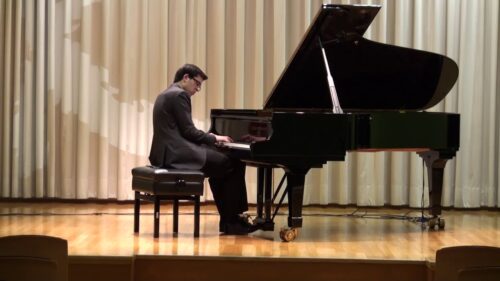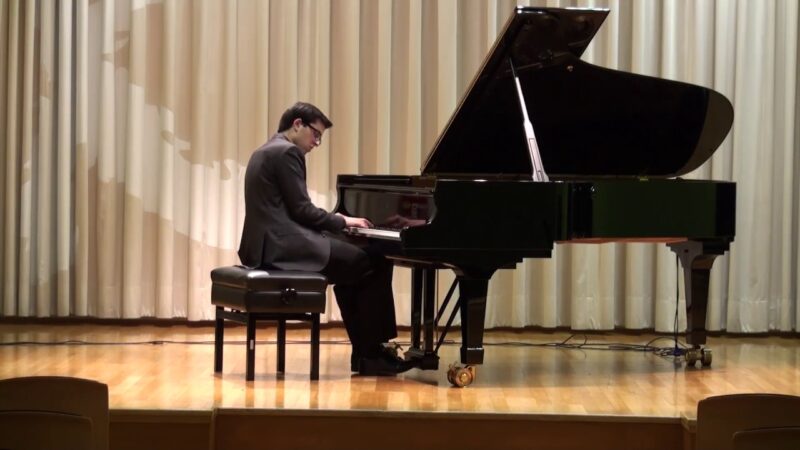 United Kingdom Frederic Rzewski, Howard Skempton, Eric McElroy and Jacob Ter Veldhuis: Eric McElroy (piano). Magdalen College, Oxford, 8.3.2022. (CR)
United Kingdom Frederic Rzewski, Howard Skempton, Eric McElroy and Jacob Ter Veldhuis: Eric McElroy (piano). Magdalen College, Oxford, 8.3.2022. (CR)

Eric McElroy – The Perilous Realm; Snowfall
Howard Skempton – Images: Prelude No.1; Interlude No.8; Variations
Frederic Rzewski – De Profundis
Jacob Ter Veldhuis – The Body of Your Dreams for piano and boombox
This recital, culminating in Frederic Rzewski’s De Profundis (1992) a work for ‘speaking pianist’ which adapts Oscar Wilde’s extraordinary letter written from prison to his lover, Lord Alfred Douglas, was aptly given under the aegis of the Music Society of Magdalen College, to which both men belonged as students. Before his performance of that work as the pianist and speaker – dedicated to the composer’s memory, after his death last year – Eric McElroy observed that Wilde’s text is as much a dialogue in his own mind as a letter directed to an external recipient, and it was in that vein that he interpreted the work. Rather than declaiming the extracts from Wilde’s letter, he uttered them with quiet eloquence, as though they were indeed taking place in the author’s mind, experimenting with various thoughts and ideas as he came to terms in the miserable confinement of his prison cell with what he had suffered – both as a result of conviction, and through the complicated, fraught relationship he had had with Douglas.
The work, lasting around half an hour, is in the form of a rondo with a recurring principal section of groans and grunts, presumably to depict vividly the torture of the hard labour Wilde underwent in prison. McElroy retained a firm control over those, as well as the intervening episodes which could otherwise become disjointed, especially with their terse, cellular interjections from the piano. Certainly there were hints of a mind on the edge of breakdown. But even with the assortment of quotations from the letter within the episodes, nevertheless the impression was of a structured sequence of ideas and emotions cogently expressed, underlined by the longer diversion for piano alone at one point, which sounds like a modern version of a Bach Invention and was despatched with an almost mechanical efficiency, bringing some sense of order and regularity (even if only ironically). The comparative reserve of this performance, eschewing histrionics, sympathetically emphasised the forlorn and resigned nature of the whole work
McElroy’s measured command in his playing was put to more sustained purpose in his own pieces and those by Howard Skempton in the first half. Both of his own works indicated a fertile compositional mind, as they teemed with a plethora of musical ideas (generally tonal though often set within more complicated harmonic backgrounds) but delineated within a clear, logical structure. The title of The Perilous Realm (2014) looked as though it might in some sense serve as a fitting reflection upon the present situation in Ukraine, although no information was given in the programme notes as to its provenance. The music told otherwise, however, as it was generally upbeat and played with considerable alacrity, from the ebullient oscillating accompaniment at the beginning, like a polka or ragtime, to leaping chords elsewhere suggesting one of Debussy’s more excitable Préludes. Despite some upheavals in the lower register of the piano, McElroy’s execution remained steady and considered, generating more warmth in a gentler, lyrical episode in a Chopinesque style.
Snowfall is a piece from 2021, which McElroy explained was inspired by the paradox of the phenomenon of falling snow which creates considerable movement and activity, but with virtually no sound, suggesting its own sort of musical silence. The piece was grounded in an ostinato in high register, pivoting around the interval of a fifth (whether intentionally or not, this made an apt, purely musical connection with the fanfare of open fifths at the outset of De Profundis) providing a dynamic accompaniment to generally wistful passages, gracefully played here, that presumably evoked the fact that a memory of Oxford’s Merton College in snow also prompted the composer to write this. Despite the apparent nod to minimalism with the repetitive ostinato, Chopin also sprang to mind with the warm resonance McElroy drew out of the piano, leading to a robust climax of chords more reminiscent of bells than anything as ethereal as snowfall, but still organically arising out of the foregoing music.
The three selections from Howard Skempton’s Images (1994) were atmospherically and subtly performed, appropriately suggesting generalised landscapes (or soundscapes, for that matter) as background music, since they were written as soundtracks to a television series about the history of photography (the collection evidently entitled for that reason, rather than denoting any parallel with Debussy’s sets of piano and orchestral pieces). The Variations’ theme was neo-Classical in its simplicity, but McElroy invested the last variation with a greater emotional depth that echoed the emotional vulnerability of Schubert’s late music.
Closing the first half of the programme was Jacob Ter Veldhuis’s The Body of Your Dreams ‘for piano and boombox’ (2004). In mixing instrumental performance with speech, it prepared the way for the similarly unorthodox format (at least in terms of Classical repertoire) of the second half, albeit in a more or less humorous or wry manner. Based upon iterations of the spoken marketing spiel and accompanying music employed in an American television advert of the 1990s for an electric slimming belt (including the catchphrase that is the title of the work) projected through the boombox, the piano’s material is generated through the principle of speech melody, in that its rhythms and harmonies derive from the electronically manipulated extracts from the original ad. In McElroy’s responsive, alert performance that material coalesced to comic effect as it mimicked and enhanced the implied musical character of the underlying speech, though when the disco-like soundtrack of the ad came in, the piano’s role no longer seemed to be a dual partner in the overall work but mere accompaniment. Even so, McElroy’s well-coordinated and agile performance enabled the work to register as a deadpan satire on, and critique of, the maddening, repetitive insincerities of all advertising media which so beset the contemporary world.
With its contrasting repertoire, this recital offered a stimulating compendium of piano music composed within the last 30 years.
Curtis Rogers
